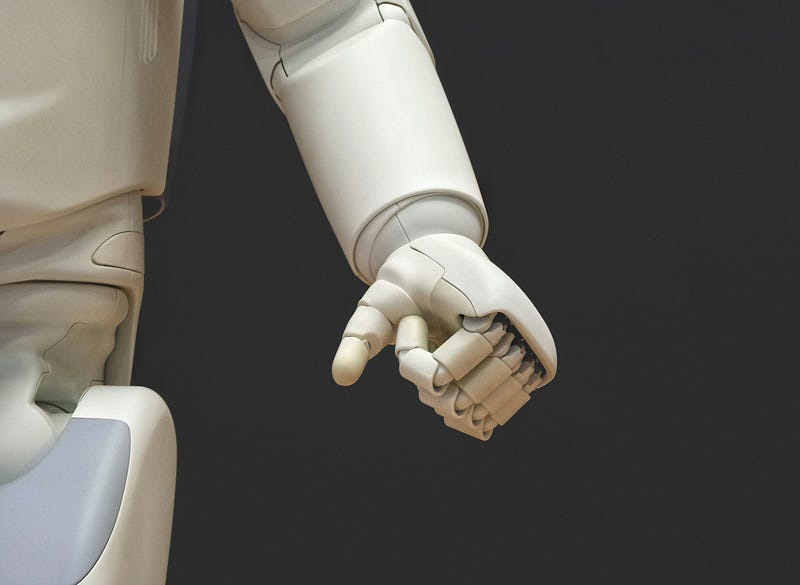"AI Godfather" Claims Universal Basic Income Will Be Needed To Tackle Job Losses From AI. Is He Right?
Probably not.

Professor Geoffrey Hinton, who, thanks to his pioneering work on artificial neural networks, is regarded as the “Godfather of AI”, recently told BBC Newsnight that he is “very worried about AI taking lots of mundane jobs”. In fact, he told the BBC, “I was consulted by people in Downing Street, and I advised them that universal basic income was a good idea.” He went on to say that he feels AI would increase productivity and wealth, but this money will only go to the rich. Was this why Hinton recently left Google’s AI team? But that isn’t the pressing question. The real issue is whether AI will really necessitate such radical benefits reform.
Universal basic income (UBI) is the idea that every citizen gets a pay cheque of the same amount from the government every month, no matter their situation. Despite what you might think, UBI is far from a pipe dream. There are multiple examples worldwide, including in the US, where UBI has been trialled successfully. Almost every single example lowered the population’s anxiety and increased productivity and life satisfaction. Moreover, many major economics schools have found that UBI can be financially feasible. In fact, the London School of Economics has found that UBI schemes that pay enough to have substantial social impacts (equivalent to £11,000 per person per year) can be easily funded by a flat tax rate of 45%. Now, that might sound like a lot, but middle and lower-income households will still take home the same or more income, as UBI will make up for the increased tax. The only reason these UBI trials haven’t sparked widespread policy changes is due to ideological political pushback and disagreements as to what level of UBI will be effective.
Now, there are plenty of predictions and studies floating around the internet that suggest AI is going to cause havoc in the global job market. A recent study asked 800 hiring managers if they would be making lay-offs due to AI replacing jobs. 78% confirmed they would be! All of these soon-to-be-gone jobs were graduate entry-level, such as research, data entry, customer service, and general office assistance. Investment bank Goldman Sachs has also predicted that in the coming years, 300 million jobs will be lost or degraded by AI. These are only two examples, but there are countless other similar studies and predictions.
Studies and predictions like this give Hinton’s warnings and proposed solution a vast wait. But sadly, these don’t align with the reality of AI.
Multiple studies and case studies now demonstrate that AI can’t reliably replace humans in even mundane jobs. In almost every case of companies that have tried to do this, the cost of hiring people to monitor and nanny the AI renders it as expensive, if not more expensive, than just hiring humans. Cruise has had to admit that remote workers have to intervene and take control of their AI-powered robotaxis every 2.5 to 5 miles! Amazon’s “just walk out” grocery stores that use AI to tally up customers’ shopping and charge their cards as they leave, rather than having to use a checkout, was so inaccurate, and it cost Amazon so much to hire remote workers to monitor and correct it, that they ended up scrapping the scheme entirely and used staff and self-checkouts instead.-
It’s also not like AI is going to get cheaper. AI development is hitting a point of diminishing returns, so even incremental improvements will cost exponentially more as AI develops. So, the vast majority of human workers are still the most cost-effective option for the foreseeable future.
So, what about those studies and those predictions? Well, notice how the study was about managers looking to use AI, not those already using it. Also, have you noticed how many investment banks like Goldman Sachs have invested hundreds of millions of dollars in AI companies? These results and predictions are misleading and motivated. As are the statements by those who lead AI companies or were crucial in developing AI technology, like Hinton. Of course, they are motivated to portray their inventions and products as potentially revolutionary; it’s only human for them to boost their ego or try to grow their business.
But the fact of the matter is that a recent poll by Bank of America found that 40% of fund managers think that AI-related stocks are in a bubble. The promises they tout are unlikely to come to fruition. So, while I’d love for UBI to become a genuine reality soon, I highly doubt it will be because of AI.
Thanks for reading! Content like this doesn’t happen without your support. So, if you want to see more like this, don’t forget to Subscribe and follow me on BlueSky or X and help get the word out by hitting the share button below.
Sources: BBC, Will Lockett, Will Lockett, Planet Earth & Beyond, Forbes, Will Lockett, Vox, LSE



